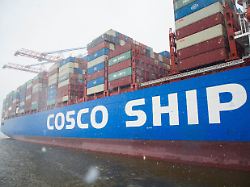“Huge bureaucratic burden”
Economists complain about the passage of the supply chain law
December 14, 2023, 9:42 p.m
Listen to article
This audio version was artificially generated. More info | Send feedback
The EU has agreed on a supply chain law and is trying to punish child labor, exploitation and environmental pollution by companies. German economists condemn this move.
The EU supply chain law, which the EU states and the European Parliament have agreed on, is a “bureaucratic monster that is anti-medium-sized and anti-development,” according to the General Association of the German Textile and Fashion Industry. Environmental protection and human rights organizations, however, welcomed the law.
The law threatens the international competitiveness of European companies, explained the managing director of the Federation of German Industries (BDI), Tanja Gönner. Because of the high requirements and legal uncertainty, companies would have to withdraw from third countries as a result of the law and would not be able to further diversify their supply chains, warned Gönner.
What is the purpose of the law?
From a certain size onwards, companies will be obliged under the Supply Chain Act to identify negative impacts of their activities on human rights and the environment and to “prevent, mitigate, end and remedy” possible consequences. They must also monitor compliance with environmental and social standards at their partner companies in the value chain. These include suppliers, sales partners, transport companies, storage service providers and waste management.
The lead negotiator in parliament, Lara Wolters, spoke of a “historic breakthrough”. The law would require companies to put “the well-being of people and the planet” before “short-term profits,” she said. The law is an “important sign of hope” for seamstresses in Bangladesh or miners in South Africa, explained the managing director of the aid organization Misereor, Pirmin Spiegel.
Economists: Suppliers not at all prepared for the law
“With the supply chain law, the EU is sidelining itself in global competition,” criticized economist Galina Kolev-Schaefer at the German Economic Institute (IW). Suppliers in many developing and emerging countries are not prepared for the requirements from Europe, and European companies have to withdraw. This creates free path for competition from China, which pays much less attention to the environment and human rights.
The law also creates “major bureaucratic burdens” for companies, explained CSU MEP Angelika Niebeler. “Even higher bureaucratic burdens and disproportionate penalties for companies” are “the opposite of what is necessary in the current difficult economic policy situation,” commented the deputy chairman of the FDP in the Bundestag, Lukas Köhler.
High fines for breaking the law
If the supply chain law is violated, companies face penalties of up to five percent of their global sales. National authorities should be responsible for monitoring and investigations. Victims of human rights violations and environmental destruction should be entitled to compensation. The law provides consumers with more clarity in their purchasing decisions, praised Christiane Seidel, responsible for food at the Federal Association of Consumer Organizations (vzbv). From the vzbv’s point of view, it is also “absolutely necessary” for state authorities to check the companies’ information, added Seidel.
However, the financial sector is not checked
The law does not initially apply to the financial sector, which will be “temporarily excluded,” explained the Council of Member States. A later inclusion of these companies is still to be examined. SPD MEP René Repasi described such a declaration of intent as “little consolation”. The EU missed the opportunity to hold the financial sector accountable. European financial companies “contribute massively to human rights violations and environmental damage through investments and loans,” said the organization Germanwatch.
Green MEP Anna Cavazzini welcomed the fact that the European regulations go well beyond the supply chain law that has been in force in Germany since the beginning of the year. The law strengthens “particularly German companies” that already pay attention to standards in human rights and environmental protection and creates “fair competitive conditions for the entire internal market,” explained Cavazzini. The European Parliament and member states still have to formally approve the agreement.
